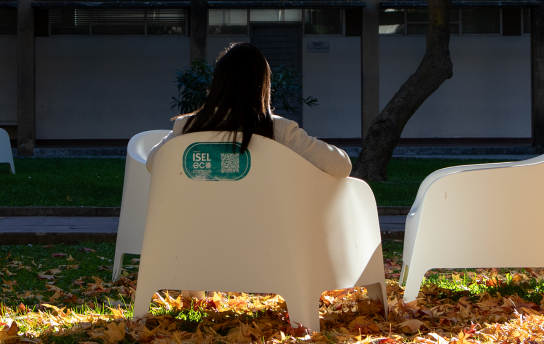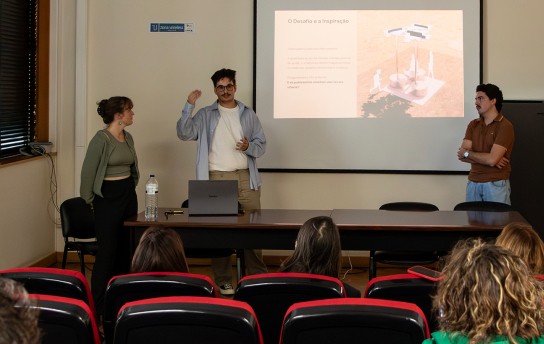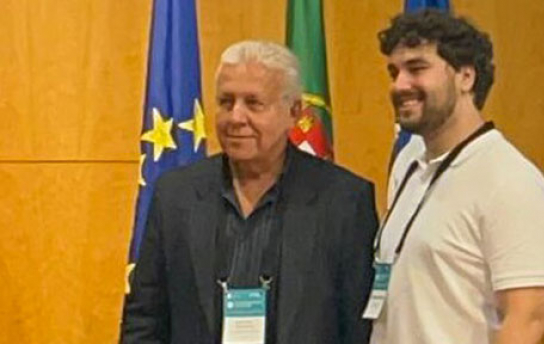As part of the ISEL Eco-Campus program, new outdoor wellness areas have been created, with chairs designed for resting, studying, or socializing.Located in the outdoor courtyards of buildings E and G and in the corridor of building P near the circular economy cabinet, these new areas invite the entire academic community to better enjoy the school's outdoor spaces.This initiative reinforces ISEL's commitment to improving outdoor spaces, making the campus more sustainable and enjoyable for everyone.Come and discover and enjoy these new rest areas!
From November 10 to 14, 2025, ISEL hosted the in-person phase of the Blended Intensive Programme (BIP) – Entrepreneurship Beyond Borders: Focusing on Climate Change, an initiative promoted by the U!REKA team of the Polytechnic University of Lisbon (IPL) and funded by the Erasmus+ program.The project targeted undergraduate, master’s, and PhD students from any field, early-stage entrepreneurs and startup founders, as well as researchers and faculty from U!REKA network partner institutions interested in innovation and business incubation.This BIP combined online sessions with in-person activities, aiming to foster sustainable entrepreneurship and carbon neutrality. The three online sessions took place between October 21 and November 18, while the in-person phase was held on the ISEL campus, bringing together international participants for five intensive days of learning and collaboration.Throughout the week, participants deepened their understanding of innovation and sustainable entrepreneurship, developed startup ideas with positive environmental impact, engaged in practical workshops, roundtables, and co-creation sessions, explored funding opportunities in Portugal and the European Union, and pitched their projects to mentors and experts, receiving constructive feedback.The program aimed to achieve, among other outcomes, a deeper understanding of sustainable innovation and entrepreneurship, financing and scalability strategies, and the development of an international, climate-conscious mindset.International participation and team The initiative brought together around 40 participants, including 25 students from Germany, Czechia, Portugal, and Austria. Jorge Albino and Nuno Aguiar, students of the Bachelor’s in Computer Science and Computer Engineering, joined international teams in developing the projects.On behalf of the Polytechnic Institute of Lisbon, the following faculty members and guests were involved:ISEL: António Serrador, Matilde Pato, Luís Barreiros, and Isabel João. Guests: Fábio Matos (NEXUS) and Nuno Alves (ANI).ESSL: Marina Silva, Mário Matos, and Gilda Cunha.ESELx: Cristina Cruz.See the photo album on Flickr.
On November 6, ISEL held the inauguration ceremony for the new President of the Technical-Scientific Council (CTC), Professor Maria Ana Baptista (DF/ISEL).The event was attended by the President of the Polytechnic Institute of Lisbon, Professor António Belo, who officially appointed the professor, praising the work of the former President, Professor João Alfredo Santos (DEC/ISEL), and highlighting the importance of this body in shaping the school’s strategic and scientific direction.In her speech, Maria Ana Baptista thanked the academic community for its trust and emphasized the importance of collaborative work: “I hope to maintain excellent coordination with the Board and all team members, as the challenges we face require unity. I believe we can create conditions for a more dynamic school, where knowledge sharing becomes a distinctive hallmark”.A few days earlier, in a private session, the remaining members of the CTC team had already taken office, in a ceremony led by ISEL’s President, Professor José Nascimento. The group includes representatives from all departments:Alessandro Fantoni (DEETC/ISEL)Ana Figueiredo (DEQ/ISEL)Carlos Meneses (DEETC/ISEL)Célia Fernandes (DM/ISEL)Fernando Sousa (DEI/ISEL)Filipa Almeida (DM/ISEL)Hiren Canacsinh (DEEEA/ISEL)José Aguilar Madeira (DM/ISEL)José Gabriel Lopes (DEEEA/ISEL)José Simão (DEI/ISEL)José Tavares (DF/ISEL)João Alfredo Santos (DEC/ISEL)João Garcia (DEM/ISEL)Luciano Jacinto (DEC/ISEL)Luís Evangelista (DEC/ISEL)Maria Amélia Loja (DEM/ISEL)Maria Paula Robalo (DEQ/ISEL)Nuno Cruz (DEI/ISEL)Paulo Marques (DEETC/ISEL)Pedro Mendes Jorge (DEI/ISEL)Sónia Martins (DEQ/ISEL)Teresa Moura e Silva (DEM/ISEL)Tiago Dias (DEETC/ISEL)Vasco Soares (DEEEA/ISEL)With this team, ISEL reinforces its commitment to academic excellence and scientific innovation—essential pillars for the development of its educational areas.See the photo album on Flickr.
On November 5, ISEL hosted the inauguration of the installation “I can’t believe it’s not a tree”, the winning project of the university competition organized by Escola da Energia and promoted by the EDP Foundation. Developed by a multidisciplinary team, mostly composed of ISEL alumni, the project combines art, engineering, and sustainability, proposing a new way of thinking about urban spaces and air quality in cities.The presentation session was led by Nuno Cordeiro and Duarte Teixeira (graduates in Electrical Engineering and Mechanical Engineering, respectively) and Catarina Gentil (Visual Artist), who shared the journey of the project from conception to the implementation of the proof of concept installed on the ISEL campus. Other team members included Cristiano Rodrigues (Electrical Engineering), Duarte Gonçalves (Informatics and Multimedia Engineering), and Maria Carnall (Product Designer).A tree that breathes technologyThe installation “I can’t believe it’s not a tree” is an urban structure built with recycled materials, equipped with photovoltaic panels, air purifiers, and environmental sensors. This “technological tree” is capable of generating clean energy and purifying the air, continuously measuring particles (PM2.5 and PM10) and carbon dioxide. The collected data is made available in real time through an online dashboard, updated every 15 minutes, allowing for near real-time environmental monitoring.“Not a tree is an air purifier, a work of art, and a living laboratory. People can enjoy the space while also tracking online the energy produced and the air quality”, explained Nuno Cordeiro during the presentation. The self-sustaining structure is powered exclusively by solar energy and was designed to operate mainly during periods of higher pollution and urban activity, maximizing its environmental impact.Art and engineering serving the cityBeyond its technological aspect, “I can’t believe it’s not a tree” incorporates a strong artistic component, resulting from collaboration between engineers and creatives.Inspired by nature, the installation proposes a “symbolic urban forest,” a space that combines aesthetics, functionality, and reflection on the role of technology in sustainability. “From the start, we wanted it to be a functional sculpture that people could enjoy. We didn’t want just a decorative piece, but something useful, beautiful, and inspiring”, said Catarina Gentil.A replicable and modular modelThe team designed the project as a prototype with expansion potential, capable of being replicated and interconnected in different urban contexts, such as bus stops, squares, or public parks.Representatives from the EDP Foundation, which promoted the competition, attended the session and expressed interest in supporting its implementation in other locations: “This project is art and engineering. It’s exactly the type of initiative we’d like to see at the EDP Foundation campus”, said Rosa Amado, Senior Project Manager at the EDP Foundation.Innovation and community at the heart of ISELRepresenting ISEL’s Board, the session also included professors Alexandra Costa (Vice-President for Infrastructure and Equipment) and Carla Viveiros (Vice-President for Pedagogy and Quality), who congratulated the team for their work and for embodying the institution’s innovative spirit.Closing the event, Professor Carla Viveiros highlighted the pride in seeing projects like this emerge from the ISEL community: “It’s always rewarding to see our students move from theory to practice. They leave, but their work remains”, she said, expressing satisfaction that students wanted to implement the proof of concept on campus. “It’s good for them and for future professionals still here, who will realize that if they have an idea, they can also make it happen with ISEL’s support. We’re here to help”, she added.Professor Alexandra Costa emphasized the value of entrepreneurship and continuous improvement: “You now have big responsibilities, with the EDP Foundation and ISEL. When this proof of concept is perfect, you might think ‘we can replicate it ten times,’ but by the 11th, new ideas should emerge. You must always improve”, she said, encouraging the team.See the photo album on Flickr.
The Polytechnic University of Lisbon (IPL) has announced the results of the 6th edition of the #ErasmusDays 2025 Photography Award, which received 101 photographs from 29 entries.Maria Luísa Geraldes Barba de Melo e Sampaio, a student in the Bachelor’s Degree in Informatics and Multimedia Engineering at ISEL, was awarded one of the three honorable mentions for her photograph “Rowing Boats on Lake Bled.” The image was captured during her Erasmus+ experience at the Budapest University of Technology and Economics in the 2024/25 academic year.From the submitted photographs, the jury selected 30 works for the ErasmusDays – IPL 2025 Exhibition, including the winning entries and honorable mentions. The exhibition will be on display at Espaço Artes – Polytechnic Institute of Lisbon, Estrada de Benfica N. 529, in November 2025 (date to be confirmed).About the InitiativeThe #ErasmusDays Photography Contest is aimed at IPL students, faculty, technical, administrative, and management staff who are currently participating or have participated in Erasmus+ mobility activities over the past three academic years.Participants’ photographs focus on the following themes:New countries | new cultures | new landscapesAcademic life experiencesSocializationThrough the #ErasmusDays Photography Contest and Exhibition, the Polytechnic Institute of Lisbon once again joins the global initiative taking place in November 2025, with the goal of promoting the Erasmus+ Program to the local, national, and international community, giving a voice to those who have never had an international experience.#ErasmusDays celebrates the Erasmus+ program with various Europe-wide activities that encourage sharing experiences and showcasing the benefits Europe offers through this international mobility program.
Miguel Rosa, a final-year student in the Bachelor’s degree in Electronics, Telecommunications and Computer Engineering of the ISEL, won first prize in the student category of the international competition promoted by the H2O & Sustainability Innovation Hub, held on October 14 and 15 at the University of Algarve, on the Penha Campus in Faro.The winning project, titled “Smart System for Microplastics Quantification and Analysis in Water”, was developed under the co-supervision of ISEL professors António Serrador and Nuno Datia, and Jan Halfar, professor at VSB – Technical University of Ostrava (Czech Republic).This is the first ISEL undergraduate final project developed in collaboration with the U!REKA European network. Its goal is to deepen understanding of the presence of microplastics in the watersheds of the municipalities of Oeiras and Lisbon, including their impact on the marine environment, thereby contributing to research and monitoring of one of today’s most pressing environmental challenges.The project also received support from the Municipal Councils of Oeiras and Lisbon, strengthening collaboration between higher education institutions, local authorities, and innovation ecosystems dedicated to sustainability, the blue economy, and environmental transition.The recognition achieved by Miguel Rosa highlights the work carried out at ISEL and within the Polytechnic of Lisbon in promoting applied research and technological solutions with real social impact — helping to train professionals capable of addressing the environmental challenges of both the present and the future.Text by MFC/GCIImages courtesy of the University of Algarve






